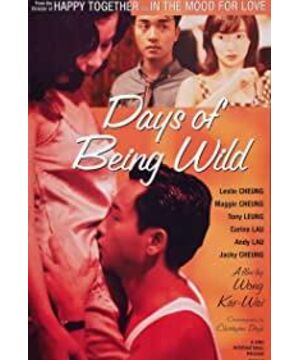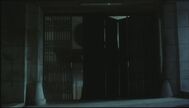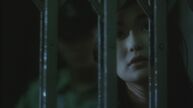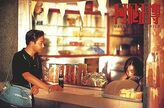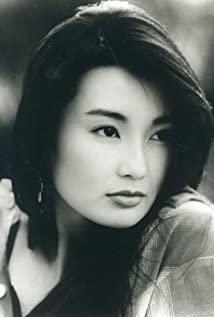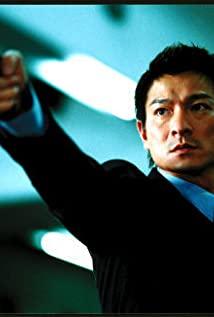The True Story of A Fei is an urban film full of nostalgia. The film borrows the lost images of a group of young people in the 1960s to project the anxiety, confusion and confusion of Hong Kong people before the handover in 1997-the inability to locate the past and the future And at a loss. The long-term colonial rule has left Hong Kong people with a sense of displacement and rootlessness that cannot be located historically and culturally. In the empty years, the "A Fei" were in full bloom with indifferent expressions. The whole film has a faint blue tone, and the ethereal lens, like a sigh, has flown over thirty years. Ah Fei (Leslie Cheung) has no sense of belonging to the home of his adoptive mother, who has lived for many years, and insists on looking for his biological mother. He is full of novel yearning and inexplicable disappointment for his distant mother and homeland; Su Lizhen (Maggie Cheung) and Mimi (Carina Lau) are extremely Longing for a stable place where they can no longer wander, a place where they can feel safe and belong. The mentality of the characters in these plays is a portrayal of the lack of stability in Hong Kong before the handover. The process of Ah Fei's search for his biological mother is actually the process of Hong Kong's retrospect of history before the handover, the process of searching for roots, family affection, and life. " A minute before 3pm on April 16, 1960 You and I will be with you because of you and I will remember this minute. We're friends for a minute from now on, that's a fact, you can't change it because it's over. "A Fei broke into Su Lizhen's emotional world with this minute of rogue and perseverance. One minute of breathing, one minute of staring, one minute of affection, one minute of romance, one minute of vows, one minute of sweetness, one minute of sweetness The warmth and love of one minute. The one minute of memory that made Su Lizhen obsessed forced her to never forget Ah Fei, but the one minute of lightness tempted Su Lizhen for a lifetime, and it became an unbearable lightness in her life. Time is never for anyone. Anything stops, but memory always wants to retain time to make it freeze, so time desperately breaks free from memory. Ah Fei only wants to fly forward, and his nature of unwilling to stay is the same as the fluidity of time. Wanting to enclose a minute's memory with sweetness, she longed for a warm family where she could live and stay. A Fei rejected him. His sense of rootlessness and drifting state made him unwilling to be bound and unwilling to take responsibility. The people who sought lifelong protection from him - Su Lizhen and later Mimi were rejected by him. When dependence became a bondage, tenderness became a sin. The contradiction between time and memory doomed the relationship between Ah Fei and the two women who loved him. There will be no results in time. Ah Fei's accuracy of time is a flattening of time, the digitization of memory, and the time limit of love - one minute before and one minute after, the subject is calculated with one minute as a scale The gradation of the projected feelings in time. Su Lizhen spends the last minute to review the previous minute, so she misses the policeman (Andy Lau) who has a crush on her. There is a kind of evasion and choice between them. Hesitating for a minute-choice, the police diverted to the boat for a phone call that might fail-to escape. Just after he left, the phone that was waiting at night rang. There are many things, and a minute is missed and a lifetime is lost. Just a moment The minutes of memory make Su Lizhen miss the happiness that truly belongs to her. Looking for his biological mother is the strong behavioral motive and spiritual direction of Ah Fei's life, for which he has given up the chance of love several times. Wandering is for finding, and when he loses his target, Ah Fei is lost. What should be gained has not been obtained, and what should be lost has long been lost. The legend of the "footless bird" symbolizes Ah Fei's innate sense of rootlessness, alienation, wandering, confusion about the future, longing for infinity and destined loss. The movie takes off with Ah Fei, and with Ah Fei landing, obsession, fantasy and pain spread with the wind while flying. Youth is a kind of beauty, but also a kind of cruel. Wong Kar Wai used the mottled mirror of the 1960s to reflect the tired soul of the 1990s.
View more about Days of Being Wild reviews


